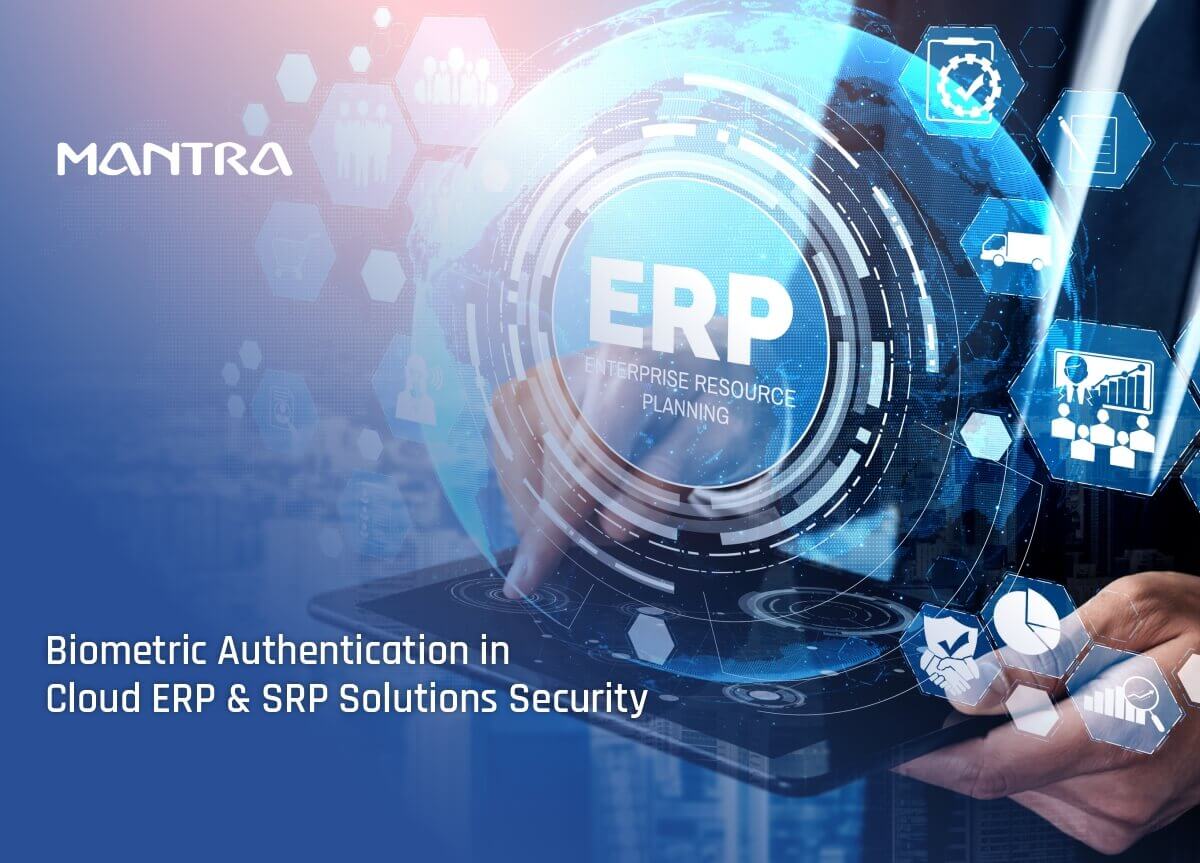
Cloud ERP (Enterprise Resource Planning) software and SRP (Service resource planning) have become an inevitable part of today's businesses due to the increased adoption of digitalization and advanced technologies. The ERP and SRP integration with business operations streamlines managing the different modules of areas such as finance, human resources, manufacturing, supply chain management, customer relationship management, and more.
Following the recent trends, businesses started leaning towards cloud systems as the trends to move behind cloud computing, remote working, and working from anywhere are growing. Since cloud ERP and SRP systems have to handle critical business data, it is important to secure them. Biometric authentication as a reliable security measure is replacing traditional authentication methods such as passwords and PINs (which have lots of flaws). Organizations of all sizes can secure their ERP and SRP system with biometrics. Let's see its importance in this blog.
Cloud ERP/SRP and Biometric Authentication
Cloud ERP and SRM software typically involve the storage and processing of valuable business information, including financial data, customer details, and operational insights. Protecting this information from unauthorized access is of utmost importance to prevent data breaches and maintain the trust of customers and stakeholders.
Biometric verification is a powerful security mechanism that can be used to enhance the security of cloud-based Enterprise Resource Planning (ERP) and Supplier Relationship Management (SRM) software systems. As conventional authentication methods like passwords and PINs are not foolproof and hackers are using advanced AI algorithms to break through, now is the time to adopt many advanced authentication methods like biometrics. By utilizing biometrics in the authentication process, organizations can strengthen access control measures and protect sensitive data.
How to turn on Biometric Authentication in your Cloud ERP/SRP? - MYAUTH
To incorporate biometrics into their cloud-based ERP/SRP software, businesses can seamlessly integrate an enterprise identity and access management solution like MYAUTH. MYAUTH adds an extra layer of security to applications, acting as a single-page application that regulates access to critical systems. With MYAUTH, businesses have the flexibility to customize the authentication process to align with their specific enterprise needs and application requirements. In addition, organizations can benefit from multifactor authentication and effortlessly integrate biometric devices for secure access to vital applications.
Download the MYAUTH brochure: click here
Determine the specific authentication method you want to integrate, such as fingerprint recognition, facial recognition, or iris scanning.
Identify the points within the cloud ERP and SRP systems where the authentication mechanism should be implemented.
Decide whether to develop new software or acquire third-party software, such as MYAUTH, based on your requirements.
Set up the biometric hardware devices, such as fingerprint scanners or facial recognition cameras, on the appropriate endpoints where users will be accessing the cloud systems.
Implement the necessary logic in the software to capture biometric data from the biometric devices.
Define a process for enrolling users' biometric data into the system. This typically involves capturing their biometric samples and storing them securely for future comparison during authentication.
Also read: Biometric Authentication; Top 5 Reasons To Invest In
Securing Cloud ERP with Biometric Authentication
Enhanced Security: Besides providing an additional layer of security for cloud ERP and SRP, biometric integration can prevent unauthorized access. This ensures that only authorized personnel can access sensitive data and perform critical operations within the ERP system. The integration can completely stop the sharing of passwords and login credentials among employees and thus eliminate any possibility of buddy access to data.
Promote remote access: It is crucial to offer trustworthy security solutions to secure data as businesses promote remote and work-from-home working. Cloud computing systems have the advantage of enabling remote work, and with biometrics, they can provide enough security for data transfers across multiple physical locations.
User Convenience: Biometrics offers a convenient way for users to access cloud ERP systems. Users can easily use their biometric traits for quick and seamless authentication without having to carry around physical tokens or remember complex passwords. Decreasing the possibility of forgotten passwords or misplaced tokens eventually increases user productivity.
Fraud Prevention: Biometrics makes it difficult for fraudulent people to impersonate others or engage in fraudulent activities. As biometric identifiers are unique to each individual, attempts to circumvent the system through identity theft or unauthorized access are significantly minimized. This guarantees the security of the data kept in the cloud-based ERP system.
Compliance with Regulations: Many industries, such as finance and healthcare, have strict regulations regarding data security and privacy. By providing a strong security mechanism for safeguarding sensitive information, biometric identification can assist enterprises in complying with these standards. Cloud ERP systems with secured authentication can show a commitment to data security and legal compliance.
Conclusion:
As cloud-based ERP and SRP software offer various advantages for enterprise management, ensuring the security of data transfer within organizations and remote working becomes crucial. Recognizing the benefits of biometric authentication across different areas, more organizations are embracing its integration into cloud software, such as ERP and SRP. This trend further enhances security measures and safeguards the integrity of data within these systems.
Comments